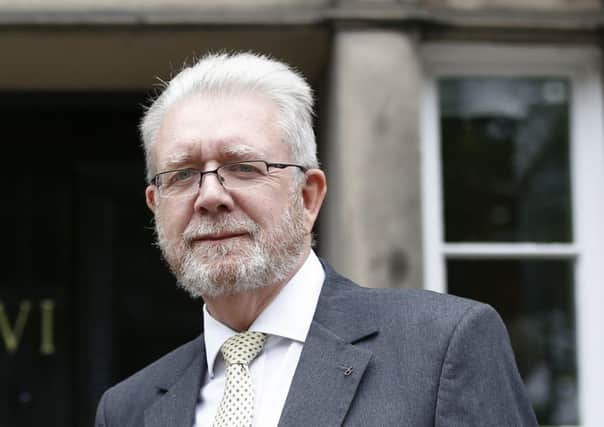Tom Peterkin: Michael Russell's Brexit blunder shows need for accuracy


In the uncertain world of Brexit and Donald Trump, ‘post truth’ politics has become all the rage.
But no matter how trendy or successful this political phenomenon may be it is not one to be admired.
Advertisement
Hide AdAdvertisement
Hide AdTherefore it was concerning to see Scotland’s Brexit minister Michael Russell take a stroll off the straight and narrow path of accuracy in Brussels this week.
Russell is not known as a dedicated follower of fashion, so perhaps it is a trifle unfair to compare his relatively low key speech to EU officials on Monday with the post truth whirlwind that has engulfed the US.
Nevertheless the claims with which he regaled his audience ought not go unremarked.
Russell’s version of the Brexit vote in Scotland was – to put it mildly – eccentric.
His description of the outcome north of the border was that “five million citizens” had “quite clearly said they do not want to give up their European citizenship”.
Taking his words at face value, it was quite an incredible result. Not only did everyone vote for Remain, but the franchise had been extended to include the entire Scottish population - all of whom voted.
We have long known that the Scottish Government favours giving the vote to those aged 16. As yet there is little detail on any plans to lower the voting age still further.
But in order to achieve Russell’s vision of a five million-strong unanimous vote, Scotland’s toddlers must have walked hand-in-hand crocodile formation from nurseries to polling stations – crayons in hand - to colour in the Remain box on ballot papers.
Advertisement
Hide AdAdvertisement
Hide AdPresumably primary school children gathered in playground shelters to weigh up Leave’s claim that Brexit would see the NHS benefit from an extra £350 million a week.
After serious discussion over their play-pieces these promising youngsters correctly deduced that this cash bonanza was a figment of the post truth era and decided to vote en masse for Remain.
Similarly Scotland’s adolescent cognoscenti managed to drag themselves away from social media and their games consoles to vote. Apparently they saw through the Brexiter slogans about “wanting our country back” and unanimously took heed of Project Fear’s warnings about economic damage wrought by EU withdrawal.
Facetiousness aside, it is not mere pedantry to take issue with the picture Russell painted of Scotland’s attitude towards Brexit.
Behind the certainty of political messaging, the facts almost always expose a more complex situation.
Rather than five million votes for Remain, Scotland actually saw 1.7 million vote to stay. One million individuals voted to Leave. The fact that Scotland recorded a sizeable Leave vote may not be a comfortable fit with the SNP’s narrative of a nation at odds with the English and Welsh majority to withdraw from the EU. The truth is that although 62 per cent of the 2.7 million or so votes cast by those aged 18 or over, there was a significant minority in favour of EU withdrawal.
Russell’s reluctance to acknowledge this strand of opinion in Scottish life even extended to his own party colleagues at Holyrood.
“The Conservatives only had, I think, four members who were pro-Brexit – everyone else in the parliament – 129 members were against Brexit,” Russell told his audience, sounding for all the world as if he was making a definitive statement of fact. There was no recognition that one of the SNP’s most senior MSPs – the former Health Secretary Alex Neil – had previously admitted voting Brexit. Neil also claimed several other SNP MSPs took the same view as him.
Advertisement
Hide AdAdvertisement
Hide AdNeil also made the obvious point that many thousands of Scottish independence supporters must have also voted for Brexit.
Again, it must have been tempting for Russell to overlook Neil’s stance on EU withdrawal because it is an inconvenient truth that does not chime with SNP leadership’s idea of a united and Europhile party.
Russell’s willingness not to pin himself down with the detail of what he was saying was to land himself in hot water when he was questioned on Scotland’s future relationship with the EU. This happened when the Brexit minister was asked specifically about whether talks were taking place with Spain about Scotland getting a special deal that would enable her to protect her relationship with the EU.
When asked whether he had already had contact with Madrid on this matter, Russell gave what might be charitably described as a typical politician’s answer.
“I am not going to reveal everybody’s conversations, but I think you can take it that as intelligent people we would not be talking in these terms unless we were having conversations,” was Russell’s reply.
Russell managed to avoid answering the question directly. But amid the circumlocution he gave the very strong impression that talks had taken place with Madrid. And that’s when he found himself in trouble.
Shortly after his words became known, checks were made with Madrid. Sure enough, there was confirmation from a Spanish Government source that no such talks had been held about a special Brexit deal for Scotland.
At this time of tense negotiation that has so many implications for Scotland and the UK’s future, it is perhaps time for politicians of all hues to get a firmer grip on reality.